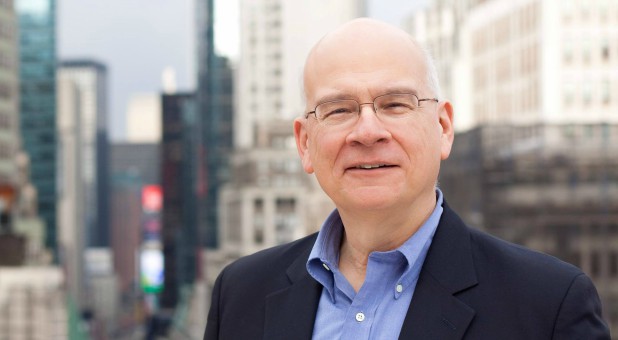Is ‘Evangelical’ Synonymous With ‘Hypocrite’?
Last month, Pastor Timothy Keller wrote an important article in The New Yorker asking, “Can Evangelicalism Survive Donald Trump and Roy Moore?” And Keller, himself a respected evangelical leader, pulled no punches in answering his question, writing, “‘Evangelical’ used to denote people who claimed the high moral ground; now, in popular usage, the word is nearly synonymous with ‘hypocrite.’ When I used the word to describe myself in the nineteen-seventies, it meant I was not a fundamentalist. If I use the name today, however, it means to hearers that I am.“
Is Pastor Keller right in his assessment? Is “evangelical” nearly synonymous with “hypocrite,” in particular, because of large-scale evangelical support for President Trump? I would say yes and no.
I say yes, for several reasons.
First, beginning in 1987, when two prominent televangelists were exposed for moral failures, we have had more than our share of scandals. This has tainted our witness and made people wary of us. We have no one to blame but ourselves. One bad apple can make 1,000 good apples appear suspect.
Second, we have not always practiced what we preached or been consistent in what we preach, denouncing one sin while overlooking another, or condemning the sinner without offering him a helping hand.
To give one case in point, we have rightly denounced same-sex “marriage” as sinful and aberrant in God’s sight while paying far less attention to no-fault divorce in the church. That is certainly worthy of the “hypocritical” moniker.
Third, to the extent that we have offered President Trump unqualified and uncritical approval, unable to acknowledge any weaknesses or errors on his part, we seem to violate our own ethical standards. How can this not appear hypocritical to a watching world, especially when that watching world is already suspicious of us?
On the other hand, I say no, for several reasons.
First, the good being done by evangelicals far outweighs the bad, almost to the point of embarrassment. In virtually every city of America, evangelicals are on the front lines of caring for the poor, serving the needy, ministering to the hurting, and so much more. This is also the pattern worldwide. Just watch when the next major disaster hits anywhere on the planet, and see who leads the way in sacrificial service.
Second, a very large percentage of evangelicals do practice what they preach, seeking to live their lives and raise their families in accordance with biblical values. In fact, this is one of the reasons why we are so hated: it is because we are different, because we are willing to go against the grain.
Just look at the highly successful homeschool movement today. This is primarily the fruit of evangelical Christians, of godly parents who made quality (and sacrificial) decisions to pull their kids out of destructive educational settings, teaching them at home. This is called integrity, not hypocrisy.
Third, for many years now, long before many evangelicals supported Donald Trump, we have been compared to Nazis, the KKK and Islamic terrorists, not to mention called bigots and homophobes and more.
Writing in May 2005, John McCandlish Phillips, formerly a Pulitzer Prize winning New York Times reporter, pointed out how newspapers like The Washington Post and the Times told their readers that evangelicals and traditional Catholics were engaging in a “jihad” against America.
As he wrote so articulately almost 13 years ago, “In more than 50 years of direct engagement in and observation of the major news media, I have never encountered anything remotely like the fear and loathing lavished on us by opinion mongers in these world-class newspapers in the past 40 days. If I had a $5 bill for every time the word ‘frightening’ and its close lexicographical kin have appeared in the Times and The Post, with an accusatory finger pointed at the Christian right, I could take my stack to the stock market.”
Today’s constant bombardment (something I have documented for some time now as well; see here, for example) has simply upped the ante of extreme, inflammatory, false accusations. It is no surprise that we are called “hypocrites” by those who despise our values and demonize us.
Fourth, it is ironic that the same world that calls us hypocrites for voting for Trump would be applauding us had we voted for Hillary Clinton (or, before that, Barack Obama). But had we voted for these liberal candidates, we would have been hypocrites, since we profess to be pro-life and they are pro-abortion, and we profess to be pro-marriage while they support redefining marriage—just to name two of the most major issues that divide us.
As for our vote for President Trump, many of us were loud and clear. We wrestled with our vote because of his immoral past, because of his sometimes- offensive behavior, and because we were not sure he was a true conservative. But given the choice between voting for a known, evil entity and voting for someone who gave us a ray of hope, it was easy to choose the latter. And in many ways, he has done more than we expected.
So, while I rue our many failings as evangelicals and have called for self-examination since the 1980s (we have no excuse for these failings), I recognize that we will always be branded hypocrites, liars and charlatans by a hateful world.
And this reminds me of an accusation brought against the early Christians, as recounted by Tertullian (160-225): “We are charged with being irreligious people and, what is more, irreligious in respect to the emperors since we refuse to pay religious homage to their spiritual majesties and refuse to swear by them. … Christians are considered to be enemies of the State, enemies of the public well-being.”
Yes, it’s always those dangerous, untrustworthy Christians. This will always be the accusation against us as long as we march to the beat of a different drummer. Welcome to the club.
















































